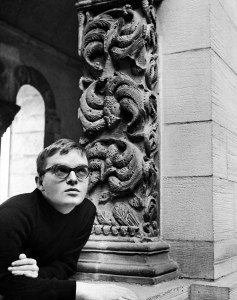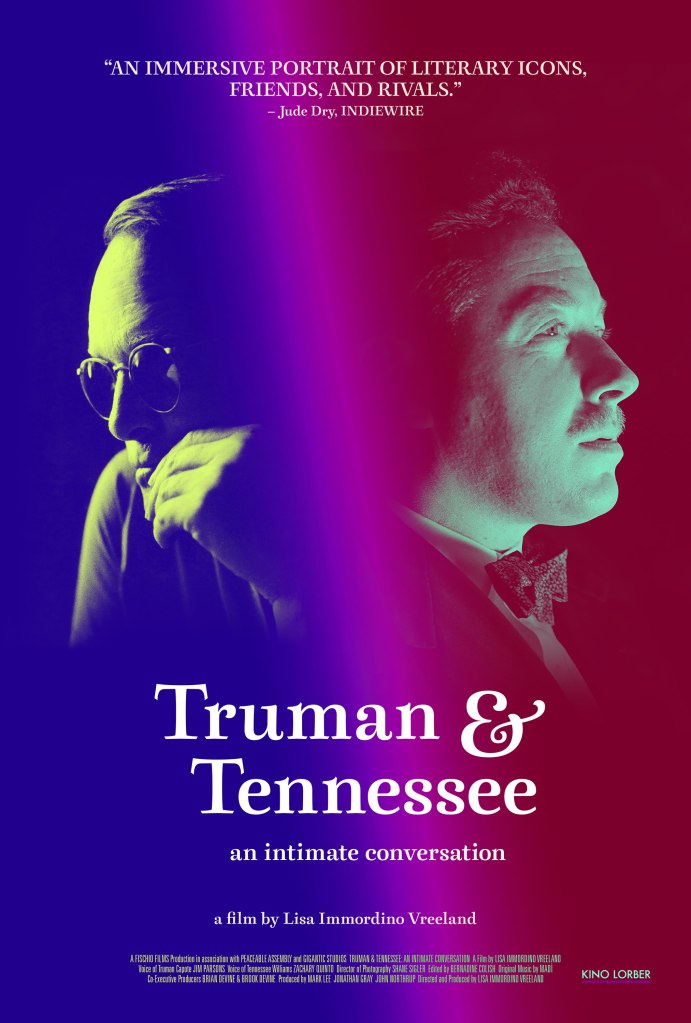Truman Capote was 16 when he first met Tennessee Williams. Williams was 13 years his senior, but they had two things in common: Both were gay, and both wanted to be writers. Not that the former has anything to do with the latter, but after hearing Capote and Williams talk about their lives and their work for 80 minutes, the connection starts to emerge. They were also depressive addicts who would eventually succumb to their disease. First was Williams, who died on Feb. 23, 1983, at the age of 71. Capote followed 18 months later, on Aug. 25, 1984. He was 59.
Those tidbits might seem trivial, but in the hands of filmmaker Lisa Immordino Vreeland, they’re informing. Ditto for the fact that both Capote and Williams took new names in their youth, traveled extensively, and owned homes in multiple countries during their successes. Both had English bulldogs, and both found themselves in the care of Doctor Feelgood—Max Jacobson, the notorious German physician known for lacing his vitamin shots with amphetamine.

But, most importantly, Capote and Williams were writers, two of the 20th century’s greatest. And Vreeland’s documentary, Truman & Tennessee: An Intimate Conversation, gives the sense that they both admired and respected each other—even if Capote was a little more gifted in the one-upmanship department. Or maybe it’s that Vreeland’s presentation of Williams makes him come off like someone who doesn’t need to try so hard.
Capote was a novelist at a time when writing a novel meant something. Williams was a playwright at a time when the stage held more artistic freedoms than the screen. It’s funny how Hollywood took both of their works, cast beautiful people to recite those beautiful lines, and then neutered them both when the Production Code demanded it. Parallels, Vreeland has plenty.
As Capote (or was it Williams?) says in the movie, “Writers live two lives: The creative life, and real life.” I think Williams said it. Regardless, they both believed it. They both lived it. Vreeland uses dueling talk shows—Capote talking to Dick Cavett; Williams to David Frost—like echoes. In one instance, both are pressured to reveal more than they’d like about their romantic relationship. And both find ways to nervously and bluntly walk their way out of the question. The longer you watch, the more like brothers they become.
Much of the credit goes to Vreeland and her editor Bernadine Colish. Almost all of Truman & Tennessee is culled from a wealth of archival interviews. And where there are gaps, Vreeland employs actors Jim Parsons and Zachary Quinto to read Capote and Williams’ words. Both do a good job matching their respective author’s cadence, though I find Quinto’s Williams a little stronger than Parsons’ Capote.
Truman & Tennessee is a fun work. It’s revealing but in a playful way. At one point in the movie, Capote talks about Holly Golightly from his novel, Breakfast at Tiffany’s. He drew inspiration from all the women who flocked to New York City, flit around for a bit, and then disappear back into the world from where they came—or worse. With his book, Capote hoped to rescue one of them from anonymity and preserve her for posterity. Not that we ever need worry that Capote or Williams will fade into anonymity, but Vreeland’s movie does bring both voices back into the spotlight just when it feels right.
Truman & Tennessee: An Intimate Conversation (2020)
Directed by Lisa Immordino Vreeland
Produced by Jonathan Gray, John Northrup, Lisa Immordino Vreeland
Starring: Truman Capote, Dick Cavett, David Frost, Jim Parsons, Zachary Quinto, Tennessee Williams
Kino Lorber, Not rated, Running time 86 minutes, Opens in select theaters June 25, 2021.
Header Photo: Tennessee Williams. Courtesy of Harry Ransom Center, The University of Texas at Austin.





You must be logged in to post a comment.